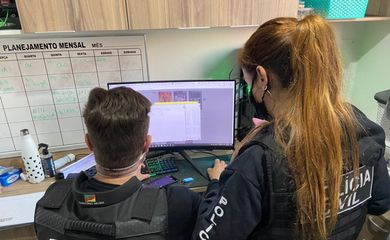RJ: purchase of pirated products involves 2.9 million people in 1 year

A survey released this Monday (6) by the Fecomércio Research and Analysis Institute (IFec RJ), reveals that about a fifth of the adult population of Rio de Janeiro (20.5%), equivalent to 2.9 million people, bought products counterfeit this year.
According to the director of IFec RJ, João Gomes, the number of consumers of pirated products in the last 12 months in the state returned to pre-pandemic levels in 2019 (3.3 million), after dropping to 1.2 million people, last year. Carried out in November, the survey heard 293 citizens of Rio de Janeiro and found that the average expense was BRL 73.5 per purchase, lower than that calculated in 2020 (BRL 94.5) and higher than that recorded in 2019 (BRL 62 ,8).
Consumers are aware that this is a pirated product, which harms the economy, they know it is a crime, but even so, many say they will continue buying,” said Gomes in an interview with Agência Brasil .
According to the survey, 93.6% of respondents know that piracy is a crime and 65.5% understand that the purchase of pirated products harms the economy of the state of Rio de Janeiro. The survey indicates that 71.9% do not intend to continue buying pirated products, although almost a third still tend to buy, which is also a high number. A relevant fact is that, for 47.6% of those surveyed, the consumption of counterfeit products favors an increase in violence and crime.
About 46.4% of respondents want more educational campaigns about the risks of the illegal health market and the damage to the economy. For 29.2% of consumers, government campaigns could collaborate, followed by industrial and retail campaigns, with 24% and 22.5%, respectively.

ranking
Counterfeit electronic equipment is the most illegally consumed item, with 28.6%, followed by clothing, with 18.8%, and shoes, bags and sneakers (17.1%). The so-called electronic piracy occupies the fourth and fifth places on the list, through the download (data transfer) via the Internet of movies (16.3%) and computer programs (15.9%), respectively. Next, there are glasses (15.1%), music downloads from the internet (10.6%), toys (9.4%), watches (9%), cable TV (8.6%), perfumes ( 7.8%), sporting goods (4.1%) and cigarettes (2.4%).
The low price is the main reason given by 75.9% of consumers for buying pirated products in the last 12 months. Respondents also pointed out how easy it is to find products (15.9%); the fact that some are “disposable” and, therefore, the quality does not matter so much (11.8%); the fact that the counterfeit article is available before the original (10.2%); and the issue of status (4.1%).
João Gomes warned, however, that depending on the product, there may be indirect consequences for the consumer, including affecting health. Shoes, for example, can cause back problems later on; a pirated electronic device or download could harm your computer; toys may contain paint or products harmful to children when placed in the mouth. These are issues that need to be addressed because many illegal products can affect the health of the consumer directly or someone close to him, he added.
Among people who claimed to have consumed pirated products in the last 12 months, 65.3% said they had already regretted the purchase. Low quality leads the list of complaints, with 86.2%. For 27.6%, the lack of guarantee was the main reason for disappointment. Other causes mentioned were negative experiences, such as the impossibility of exchange (13.2%), discovering that the product was stolen (4.6%) and health problems caused by the use of the product (1.3%).
For 59.6% of respondents, original products are more expensive because of high taxes. Among the solutions to combat piracy, there were cited reductions in the tax burden (79%), improvement in education (52.8%), awareness of the population about the damage caused by the consumption of these products (46.8%), employment (43 .8%), approval of tougher laws and longer sentences (22.5%) and increased integration between the Federal and State Police (12.7%).
João Gomes highlighted that pirated items, which are not taxed on production, importation or sale, end up harming tax collection and promoting unfair competition with formal trade, also contributing to unemployment and increased crime.
e-commerce
Another concern is the expansion of online sales, against the backdrop of the covid-19 pandemic. For 69.3% of respondents, the growth of purchases in the virtual world could increase the sale of pirated products, revealing an increase of 7 percentage points compared to last year; 43.1% confirmed that they would have bought a pirated product on the internet, thinking it was original, a growth of 13 percentage points compared to 2020. The survey confirmed, however, that consumers are paying attention because 91.8% said they make sure that the site is insurance to avoid problems with counterfeit or stolen products.
According to Gomes, the work developed by the Fecomércio RJ System in combating piracy received this year the National Prize to Combat Piracy (PNCP), in the Educational category - consumer-oriented impacts, an initiative of the National Council for Combating Piracy (CNCP ), linked to the Ministry of Justice and Public Security. The initiative aims to draw attention to the need to avoid illegal trade, which is linked to organized crime and harms formal trade.
Text translated using artificial intelligence.





